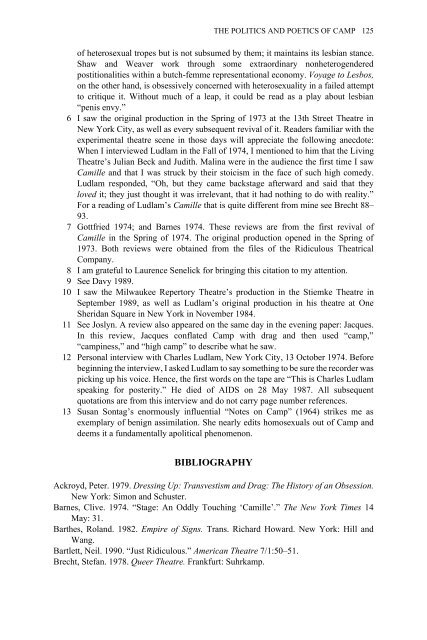Edited by Moe Meyer - Get a Free Blog
Edited by Moe Meyer - Get a Free Blog
Edited by Moe Meyer - Get a Free Blog
Create successful ePaper yourself
Turn your PDF publications into a flip-book with our unique Google optimized e-Paper software.
THE POLITICS AND POETICS OF CAMP 125<br />
of heterosexual tropes but is not subsumed <strong>by</strong> them; it maintains its lesbian stance.<br />
Shaw and Weaver work through some extraordinary nonheterogendered<br />
postitionalities within a butch-femme representational economy. Voyage to Lesbos,<br />
on the other hand, is obsessively concerned with heterosexuality in a failed attempt<br />
to critique it. Without much of a leap, it could be read as a play about lesbian<br />
“penis envy.”<br />
6 I saw the original production in the Spring of 1973 at the 13th Street Theatre in<br />
New York City, as well as every subsequent revival of it. Readers familiar with the<br />
experimental theatre scene in those days will appreciate the following anecdote:<br />
When I interviewed Ludlam in the Fall of 1974, I mentioned to him that the Living<br />
Theatre’s Julian Beck and Judith. Malina were in the audience the first time I saw<br />
Camille and that I was struck <strong>by</strong> their stoicism in the face of such high comedy.<br />
Ludlam responded, “Oh, but they came backstage afterward and said that they<br />
loved it; they just thought it was irrelevant, that it had nothing to do with reality.”<br />
For a reading of Ludlam’s Camille that is quite different from mine see Brecht 88–<br />
93.<br />
7 Gottfried 1974; and Barnes 1974. These reviews are from the first revival of<br />
Camille in the Spring of 1974. The original production opened in the Spring of<br />
1973. Both reviews were obtained from the files of the Ridiculous Theatrical<br />
Company.<br />
8 I am grateful to Laurence Senelick for bringing this citation to my attention.<br />
9 See Davy 1989.<br />
10 I saw the Milwaukee Repertory Theatre’s production in the Stiemke Theatre in<br />
September 1989, as well as Ludlam’s original production in his theatre at One<br />
Sheridan Square in New York in November 1984.<br />
11 See Joslyn. A review also appeared on the same day in the evening paper: Jacques.<br />
In this review, Jacques conflated Camp with drag and then used “camp,”<br />
“campiness,” and “high camp” to describe what he saw.<br />
12 Personal interview with Charles Ludlam, New York City, 13 October 1974. Before<br />
beginning the interview, I asked Ludlam to say something to be sure the recorder was<br />
picking up his voice. Hence, the first words on the tape are “This is Charles Ludlam<br />
speaking for posterity.” He died of AIDS on 28 May 1987. All subsequent<br />
quotations are from this interview and do not carry page number references.<br />
13 Susan Sontag’s enormously influential “Notes on Camp” (1964) strikes me as<br />
exemplary of benign assimilation. She nearly edits homosexuals out of Camp and<br />
deems it a fundamentally apolitical phenomenon.<br />
BIBLIOGRAPHY<br />
Ackroyd, Peter. 1979. Dressing Up: Transvestism and Drag: The History of an Obsession.<br />
New York: Simon and Schuster.<br />
Barnes, Clive. 1974. “Stage: An Oddly Touching ‘Camille’.” The New York Times 14<br />
May: 31.<br />
Barthes, Roland. 1982. Empire of Signs. Trans. Richard Howard. New York: Hill and<br />
Wang.<br />
Bartlett, Neil. 1990. “Just Ridiculous.” American Theatre 7/1:50–51.<br />
Brecht, Stefan. 1978. Queer Theatre. Frankfurt: Suhrkamp.


